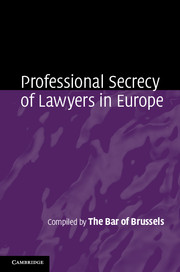Book contents
- Frontmatter
- Contents
- Contributors
- Preface
- 1 Professional secrecy in Europe
- 2 The CCBE rules on professional secrecy
- 3 Austria
- 4 Belgium
- 5 Bulgaria
- 6 Cyprus
- 7 Czech Republic
- 8 Denmark
- 9 Estonia
- 10 Finland
- 11 France
- 12 Germany
- 13 Greece
- 14 Hungary
- 15 Iceland
- 16 Ireland
- 17 Italy
- 18 Latvia
- 19 Liechtenstein
- 20 Lithuania
- 21 Luxembourg
- 22 Malta
- 23 The Netherlands
- 24 Norway
- 25 Poland
- 26 Portugal
- 27 Romania
- 28 Slovakia
- 29 Slovenia
- 30 Spain
- 31 Sweden
- 32 Switzerland
- 33 United Kingdom
- Index
16 - Ireland
Published online by Cambridge University Press: 05 June 2013
- Frontmatter
- Contents
- Contributors
- Preface
- 1 Professional secrecy in Europe
- 2 The CCBE rules on professional secrecy
- 3 Austria
- 4 Belgium
- 5 Bulgaria
- 6 Cyprus
- 7 Czech Republic
- 8 Denmark
- 9 Estonia
- 10 Finland
- 11 France
- 12 Germany
- 13 Greece
- 14 Hungary
- 15 Iceland
- 16 Ireland
- 17 Italy
- 18 Latvia
- 19 Liechtenstein
- 20 Lithuania
- 21 Luxembourg
- 22 Malta
- 23 The Netherlands
- 24 Norway
- 25 Poland
- 26 Portugal
- 27 Romania
- 28 Slovakia
- 29 Slovenia
- 30 Spain
- 31 Sweden
- 32 Switzerland
- 33 United Kingdom
- Index
Summary
Preliminary note
Lawyers in the Republic of Ireland (whether solicitors or barristers) are subject to duties of lawyer–client confidentiality.
Private entities such as banks or limited companies who employ in-house counsel are entitled to claim privilege over advice that they receive from them in limited circumstances. However, the recent ECJ decision in the Akzo Nobel case indicates that advice obtained from in-house counsel in these circumstances is not covered by legal privilege in EU competition investigations. This decision has not yet been considered by the Irish courts.
Scope of and limitations on professional secrecy
Statutory basis and implications
Lawyer–client privilege is a long-established legal principle in Ireland, primarily enshrined in common law but also reflected in various statutory provisions such as those outlined in this chapter.
In general, a client is entitled to refuse to disclose (and to prevent his or her lawyer from disclosing) confidential lawyer–client communications connected with the giving of legal advice. In addition to lawyer–client privilege, disclosure may also be refused on the basis of litigation privilege, which is also discussed below. In general, the court has no discretion to override the privilege on the basis of some countervening public interest. However, there are limited exceptions to this. Privilege can be waived by the client.
- Type
- Chapter
- Information
- Professional Secrecy of Lawyers in Europe , pp. 259 - 269Publisher: Cambridge University PressPrint publication year: 2013



